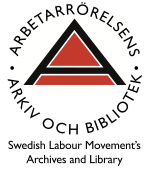- Seminariet ingår i serien Global arbetarhistoria
Seminarium inom ramen för serien Global Arbetarhistoria, med Leon Fink, University Illinois-Chicago
We are generally sensitive today to how ‘global’ or international commerce has become – as have almost all our economic problems. Yet, if recent economic activity has generally moved in this global direction—so much so that many call our times the ‘era of globalization’—the shipping industry, including its labor relations, has always been so. Perhaps not surprisingly, given recent experience, maritime labor movements, much like their landed counterparts, have regularly switched back and forth between more protective ‘nationalist’ and more expansive ‘internationalist’ responses to the problem of what I call ‘sweatshops at sea.’
In this centenary of commemoration and reflection on the era of World War I, I look here at the first great pre-WWI initiative by an emergent international maritime union movement—centered in Britain but extending to seafarers on the Continent (including Sweden) as well as North America–to rely on the self-activity of collective bargaining and even syndicalist, direct-action strategies to advance sailor welfare. Focused on trade union efforts to impose a single world standard of wages and laboring conditions for sailors and dockworkers via coordinated, international strike actions in 1911, the paper closely tracks the tactical and strategic dilemmas facing British seamen’s leader Havelock Wilson and the International Transport Workers’ Federation which he had helped birth.
Alas, even as pre-war cooperation and ideals of solidarity pointed towards an egalitarian reconciliation of national and racial differences, a chastened war-time and post-war atmosphere—especially in Britain–precipitated more nationalist, corporatist, and even openly racist ‘solutions’ to the maritime labor problem. In short, in a display of the best and the worst of impulses within the world’s organized labor movement, we are presented here with a microcosm of an enduring political challenge.
Leon Fink is Distinguished Professor of History at the University of Illinois-Chicago. He is a a specialist in American labor, immigration history, and the Gilded Age/Progressive Era he is also the editor of Labor: Studies in Working Class History of the Americas.
Plats: Arbetarrörelsens Arkiv och Bibliotek, Elektronvägen 2, 141 49 HUDDINGE (Pendeltåg: Flemingsberg)
Seminariet hålls på engelska, ingen föranmälan krävs.
För mer information skicka mail till leos.muller[at] historia.su.se eller Silke.Neunsinger[at]arbark.se
Arrangeras i samarbete mellan Arbetarrörelsens arkiv och bibliotek och Centrum för maritima studier, Stockholms universitet

